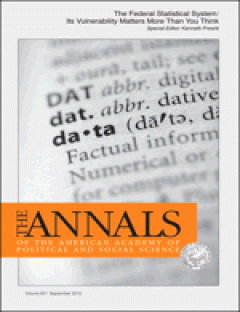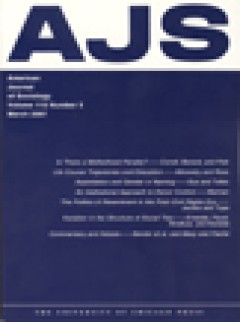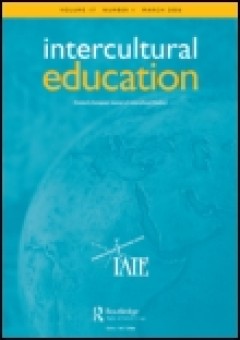Filter by

Principles and Practices for the Federal Statistical System: The View from th…
The Committee on National Statistics (CNSTAT) was established in 1972 to improve the statistical methods and information upon which public policy decisions are based, thereby furthering the ability of the highly decentralized federal statistical system to deliver relevent, timely, and cost-effective information. While CNSTATís original mandate was to provide an independent and objective resourc‚Ķ
- Edition
- Vol. 631 no. 1, September 2010. pp. 210-224
- ISBN/ISSN
- 00027162
- Collation
- -
- Series Title
- The ANNALS of the American Academy of Political and Social Science
- Call Number
- -

What Is Political Interference in Federal Statistics?
Federal statistical agencies are funded and supervised by elected and appointed politicians. What counts as politial interference is not self-evident. This article offers a working definition of interference, emphasizing the importance of an agency offering its best judgment regarding accurate measurement of a given phenomenon, its ability to apply state-of-the-art science in that measurement, …
- Edition
- Vol. 631 no. 1, September 2010. pp. 225-238
- ISBN/ISSN
- 00027162
- Collation
- -
- Series Title
- The ANNALS of the American Academy of Political and Social Science
- Call Number
- -

Redistributing toward the Rich: Strategic Policy Crafting in the Campaign to …
Beginning in 1938, some American business groups campaigned to repeal the Sixteenth Amendment and limit the federal taxation of income and wealth. Although their proposed upward?redistributive policy would benefit few voters, it won the support of 31 state legislatures. To explain this outcome, this article offers a theory of strategic policy crafting by advocacy groups. Such groups may succeed…
- Edition
- Volume 116 Number 1, July 2010.pp. 1‚Äď52
- ISBN/ISSN
- 00029602
- Collation
- -
- Series Title
- American Journal of Sociology
- Call Number
- -

Trouble in Store: Probes, Protests, and Store Openings by Wal‚ÄźMart, 1998‚Äď‚Ķ
The authors consider how uncertainty over protest occurrence shapes the strategic interaction between companies and activists. Analyzing Wal?Mart, the authors find support for their theory that companies respond to this uncertainty through a ďtest for protestĒ approach. In Wal?Martís case, this consists of low?cost probes in the form of new store proposals. They then withdraw if they face prote‚Ķ
- Edition
- Volume 116 Number 1, July 2010.pp. 53‚Äď92
- ISBN/ISSN
- 00029602
- Collation
- -
- Series Title
- American Journal of Sociology
- Call Number
- -

Changing to Win? Threat, Resistance, and the Role of Unions in Strikes, 1984‚‚Ķ
Much of what we know about strikes is grounded in the context of postwar Fordism, a unique historical moment of relatively institutionalized labor?management relations. Yet the resurgence of corporate resistance over the past quarter century, coupled with an increasingly hostile political and economic climate, has fundamentally transformed the American industrial landscape. Drawing from this re…
- Edition
- Volume 116 Number 1, July 2010.pp. 93‚Äď129
- ISBN/ISSN
- 00029602
- Collation
- -
- Series Title
- American Journal of Sociology
- Call Number
- -

The Civilizing Process and Its Discontents: Suicide and Crimes against Person…
A spatial analysis of data for French dťpartements assembled in the 1830s by Andrť?Michel Guerry and Adolphe díAngeville examines the impacts of modernization and resistance to governmental ďFrenchificationĒ policies on measures of violence and its direction. In the context of Unnithan et al.ís integrated model of suicide and homicide, high suicide rates in the northern core and a predilection ‚Ķ
- Edition
- Volume 116 Number 1, July 2010.pp. 130‚Äď86
- ISBN/ISSN
- 00029602
- Collation
- -
- Series Title
- American Journal of Sociology
- Call Number
- -

Racial Boundary Formation at the Dawn of Jim Crow: The Determinants and Effec…
This article examines variation in the social position of mixed?race populations by exploiting county?level variation in the degree of occupational differentiation between blacks and mulattoes in the 1880 U.S. census. The role of the mixed?race category as either a ďbuffer classĒ or a status threat depended on the class composition of whites. Black/mulatto occupational differentiation was great‚Ķ
- Edition
- Volume 116 Number 1, July 2010.pp. 187‚Äď231
- ISBN/ISSN
- 00029602
- Collation
- -
- Series Title
- American Journal of Sociology
- Call Number
- -

Falling Short of the Promise: Poverty Vulnerability in the United States and …
The welfare state promises to moderate the duration and concentration of poverty. The authors ask how well this promise has been fulfilled in the United States and Britain from 1993 to 2003. They examine two aspects of poverty vulnerability during this period of welfare reform: (1) its persistence and associated risk factors and (2) the efficacy of social transfers. After accounting for measure…
- Edition
- Volume 116 Number 1, July 2010.pp. 232‚Äď71
- ISBN/ISSN
- 00029602
- Collation
- -
- Series Title
- American Journal of Sociology
- Call Number
- -

Cooperative learning: a diversified pedagogy for diverse classrooms
As a generic and diversified pedagogy, cooperative learning (CL) reaches out to the field of intercultural education with an offer to establish a reciprocal relationship. After a short description of the diversity of CL and a brief exploration of the influence that culture has on learning, this paper depicts how the partnership between CL and intercultural education can help to create a cultura…
- Edition
- Volume 21, Issue 3 June 2010 , pages 195 - 203
- ISBN/ISSN
- 14675986
- Collation
- -
- Series Title
- Intercultural Education
- Call Number
- -

Hope of cooperative learning: intentional talk in Albanian secondary school c…
The notion of a knowledge society has led policy-makers and reformers to look for classroom practices that would lead to more productive learning in schools. Modern educational technologies are often thought to transform the traditional presentation-recitation mode of instruction into more participatory learning. This paper assumes that teaching for modern intercultural knowledge societies shou…
- Edition
- Volume 21, Issue 3 June 2010 , pages 205 - 218
- ISBN/ISSN
- 14675986
- Collation
- -
- Series Title
- Intercultural Education
- Call Number
- -

Complex Instruction: managing professional development and school culture
Complex Instruction (CI) is a comprehensive programme relating to curriculum development and instructional methodology, using multiple ability tasks and status interventions as key concepts. In 2006, at the end of a teacher training course, a group of primary school teachers decided to develop and experiment with original CI teaching units in their classrooms in Bologna and the surrounding prov…
- Edition
- Volume 21, Issue 3 June 2010 , pages 219 - 227
- ISBN/ISSN
- 14675986
- Collation
- -
- Series Title
- Intercultural Education
- Call Number
- -

Cooperative learning for educational reform in Armenia
Armenia is in the midst of major educational reforms in which teacher professional development is a key component. Much of the energy devoted to developing education in Armenia is targeted towards enhancing student-centred teaching, especially cooperative learning. This has become a significant challenge for many schools and teachers as they cope with understanding, learning and adapting these …
- Edition
- Volume 21, Issue 3 June 2010 , pages 229 - 242
- ISBN/ISSN
- 14675986
- Collation
- -
- Series Title
- Intercultural Education
- Call Number
- -

Cooperative learning as method and model in second-language teacher education
This paper describes the integration of cooperative learning (CL) activities into a graduate teacher education course, Collaborative Teaching in English as a Second Language (ESL). Because teachers and researchers have both identified discipline status and relationship issues as challenges to collaboration, this course focused on relational dynamics such as respect, trust, reciprocity, and appr…
- Edition
- Volume 21, Issue 3 June 2010 , pages 243 - 255
- ISBN/ISSN
- 14675986
- Collation
- -
- Series Title
- Intercultural Education
- Call Number
- -

Cooperative learning - a double-edged sword: a cooperative learning model for…
Although very little research has been done on cooperative learning (CL) in New Zealand, international research is positive about the educational benefits of working in culturally diverse groups. This paper presents the findings of a research project examining New Zealand experiences with CL in multicultural groups. Data were collected via surveys and focus groups with domestic and internationa…
- Edition
- Volume 21, Issue 3 June 2010 , pages 257 - 268
- ISBN/ISSN
- 14675986
- Collation
- -
- Series Title
- Intercultural Education
- Call Number
- -

Theoretical framework for Cooperative Participatory Action Research (CPAR) in…
This paper describes a long-term research seminar, developed in 2001 by Hertz-Lazarowitz at the University of Haifa (UH). The goal of the seminar was to involve students in a meaningful, experiential and cooperative-interactive learning environment, based on topics relevant to their development as individuals coming from diverse collectives to the university campus, and to prepare them for life…
- Edition
- Volume 21, Issue 3 June 2010 , pages 269 - 279
- ISBN/ISSN
- 14675986
- Collation
- -
- Series Title
- Intercultural Education
- Call Number
- -

A dynamic conception of humanity, intercultural relation and cooperative lear…
The main focus of this paper relates to the conceptualizations of human identity and intercultural relations needed for cooperative learning (CL) to occur. At one extreme, some have argued that the relation between different cultures should be conceptualized in terms of incommensurability. At the other extreme, a standardization and unification along with the trend of globalization is supported…
- Edition
- Volume 21, Issue 3 June 2010 , pages 281 - 290
- ISBN/ISSN
- 14675986
- Collation
- -
- Series Title
- Intercultural Education
- Call Number
- -

Cultural diversity in compulsory education: an overview of the context of Mad…
This paper examines educational practices in Spain and in particular Madrid. With this contextual frame as the starting point the following issues are discussed: the 'official' conceptualization of cultural diversity, educational policies and resolutions related to cultural diversity, and school programs and resources facilitated by educational authorities to address diversity. The analysis was…
- Edition
- Volume 21, Issue 4 August 2010 , pages 299 - 315
- ISBN/ISSN
- 14675986
- Collation
- -
- Series Title
- Intercultural Education
- Call Number
- -

Interculturality and intercultural education in Portugal: recent developments
The Portuguese approach to cultural diversity anchors on the principle of Interculturality; within the framework of mutual respect, it embraces the value and richness of diversity and dialogue. This intercultural approach is embedded in the paradigm of an equal value of all cultures and cultural miscegenation, moving thus far beyond a multicultural coexistence framework. This intercultural appr…
- Edition
- Volume 21, Issue 4 August 2010 , pages 317 - 327
- ISBN/ISSN
- 14675986
- Collation
- -
- Series Title
- Intercultural Education
- Call Number
- -

Intercultural development in the Romanian school system
The present paper aims to briefly describe the manner in which intercultural education is perceived in the Romanian school system, as well as the solutions that are being proposed (mainly in the form of activities) for reconsidering and strengthening interculturality as a dimension of education. We report on the results of semi-structured questionnaires, a survey, and several case studies.
- Edition
- Volume 21, Issue 4 August 2010 , pages 329 - 339
- ISBN/ISSN
- 14675986
- Collation
- -
- Series Title
- Intercultural Education
- Call Number
- -

The effects of the 'Welcome Schools' Program in Madrid, Spain: an ethnographi…
The aim of this paper is to share the conclusions of a recent ethnographic study carried out in Madrid from 2005 to 2008 to analyze the effects of a program implemented by the Community of Madrid, Spain, to address diversity in schools. The Program was given an English name - 'Welcome Schools' - and was aimed at preparing children recently arrived from outside Spain for entry into the regular s…
- Edition
- Volume 21, Issue 4 August 2010 , pages 341 - 350
- ISBN/ISSN
- 14675986
- Collation
- -
- Series Title
- Intercultural Education
- Call Number
- -
 Computer Science, Information & General Works
Computer Science, Information & General Works  Philosophy & Psychology
Philosophy & Psychology  Religion
Religion  Social Sciences
Social Sciences  Language
Language  Pure Science
Pure Science  Applied Sciences
Applied Sciences  Art & Recreation
Art & Recreation  Literature
Literature  History & Geography
History & Geography